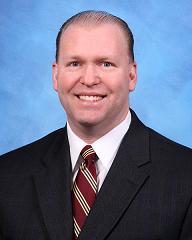 Jeffrey Carlson, MD, board-certified orthopedic surgeon, is the president of Orthopaedic and Spine Center in Newport News, Va. He also serves as the chief of surgery at Bon Secours Mary Immaculate Hospital in Newport News. Here he discusses how his family's background in carpentry shaped his career path, his excitement for developments in minimally invasive surgery and how the Baby Boomers will affect healthcare.
Jeffrey Carlson, MD, board-certified orthopedic surgeon, is the president of Orthopaedic and Spine Center in Newport News, Va. He also serves as the chief of surgery at Bon Secours Mary Immaculate Hospital in Newport News. Here he discusses how his family's background in carpentry shaped his career path, his excitement for developments in minimally invasive surgery and how the Baby Boomers will affect healthcare.
Q: Why did you choose to become an orthopedic surgeon?
Dr. Jeffrey Carlson: Growing up in my family, there was a requirement to help the family business. My uncles were all carpenters and added my brothers and myself to their team of workers as high students. We learned the skills needed to use hand tools — back then my dad didn't believe in electric powered tools. This experience taught us the necessary hand-eye coordination and engineering thoughts behind materials that lend themselves to good buildings. Understanding constructs that can bear loads and provide a pleasing aesthetic were very important in our carpentry work.
This also taught us the value of hard work in producing an outstanding product. The physical labor part also taught me that this job would be a young man's profession. Around this same time, my older brother had torn his ACL in a soccer game. We had four boys in our family, so we spent a lot of time in the orthopedist's office. Our orthopedic surgeon had grown to know us and was quite pleased to give us intimate details about his work. Being boys, we wanted to know all the gory details. In these discussions, he had mentioned that as a young boy, he had also worked with his father as a mechanic and would have pursued a career fixing engines if he did not become an orthopaedic surgeon. This thought brought a light to my head. I like tools, fixing things and making things work. Couldn't this be applied to bones? Carpentry was a great preparation for using drills, saws and screwdrivers to add plates and screws to bones.
Q: How has orthopedics changed since you began to practice?
JC: Over the past 12 years, orthopedics has been continually improving. The goal of our surgeries has always been to improve function, motion and therefore activity. As we pursue these goals, surgeries are becoming less traumatic. Decreasing the injury of the surgery itself to the body, has markedly improved the outcomes of our surgeries. Less exposure of the boney anatomy has led to less damage to the soft-tissue and quicker return to work and lifestyle.
We continue to push the envelope on pain control which then allows these less invasive surgeries to be done in an outpatient setting. Keeping our patients more productive will also keep them happier. Less exposure at the time of surgery also decreases the time in the hospital, decreasing costs and risk of infection. Pursuit of improved outcomes needs to include the patient's ability to return to their normal pre-operative activities and back to enjoying life. Good looking x-rays may not tell the whole story; getting the patient's functional parameters will give a broader picture of the surgical success.
Q: What do you think are the most important issues affecting orthopedic surgeons today?
JC: I think one of our biggest issues in the next few years will be our increasing number of patients in the Baby Boomer age group. As this large population gets older, they will require more orthopedic interventions. Unfortunately the number of orthopedists available today will not cover the number of patients that will be hitting the senior citizen level in the next few years. This is compounded by the uncertainty in healthcare scene now. Whether or not our country and our citizens will be able to afford the care needed for this older group as these Baby Boomers retire and stop paying into the system that is required for supporting their healthcare needs [is a very important issue]. I believe there is a struggle coming in orthopedics around the need for services and the lack of recourses.
Q: What changes do you see on the horizon for orthopedic surgery?
JC: Orthopedics will continue to be at the forefront of healthcare delivery. As we look into the future, adequate function will always be paramount. Providing the best functional outcomes will drive the next chapter in orthopedics. What surgical or non-surgical treatments will let patients get back to their normal functional status? Our profession is very goal-oriented. We have ways of measuring motion, speed and activity levels so can provide an objective list of outcomes from any particular intervention. Patient satisfaction is often based on these objective numbers, but also helps us shape the particular parameters that we measure. The future of orthopedics will revolve around these patient-driven outcome measures.
A series of articles featuring orthopedic surgeons on issues ranging from personal background to current research developments is published weekly. We invite all orthopedic surgeons and sports medicine specialists to participate.
If you are interested please email cpallardy@beckershealthcare.com.
More Articles on Sports Medicine:
Dr. Jason Roberts Joins Bronson Orthopedics & Sports Medicine With Services by HealthCare Midwest
Dr. Neal ElAttrache to Perform Shoulder Surgery on Phillies Pitcher Roy Halladay
CentraState Medical Center Names Dr. Alan Nasar Chairman of Orthopedic Surgery Department


